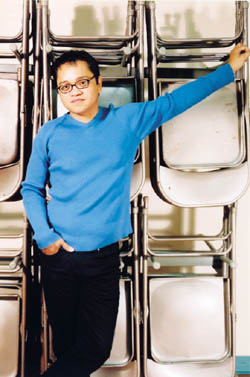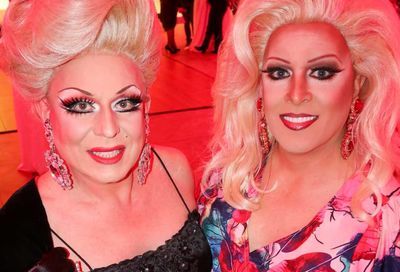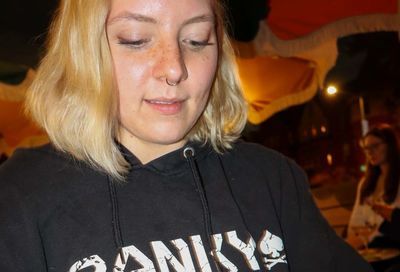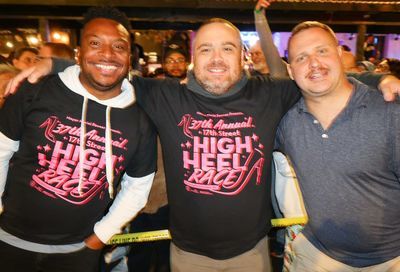Asian Influence
ASIA Theatre Company's Edu. Bernadino
Photography by Michael Wichita
Edu. Bernardino has a serious case of boy band on the brain.
Though not an uncommon malady these days, Bernardino comes by his affliction in a decidedly uncommon way. The company he founded in 1998, Asian Stories in America (ASIA) Theatre, is staging the world premiere of Boyz of All Nationz: The Rise and Fall of a Multi-Ethnic Boy Band by Thai-American playwright Prince Gomolvilas. Though it’s the fourth Gomolvilas show ASIA has produced, Boyz of All Nationz is the first play ever commissioned by the company that receives its artistic leadership from the Filipino-American Bernardino.
 |
He also has more at stake creatively than usual, since Bernardino serves as the director, scenic designer and costumer for the locally set show, which casts a satirical eye on the post-NKOTB, pre-*NSync realm of 1994, where four young men of questionable talent are pushed toward pop music stardom by a sad sack Svengali who lost his last gig — animal keeper at the National Zoo — when he taught the monkeys how to smoke cigarettes.
“American” weighs heavily in the Asian-American theatrical equation Bernardino envisions for ASIA, not unlike the cultural duality of his own life. His family moved from the Philippines to the United States in 1974 when Bernardino was eleven years old. He returned to the Philippines to study filmmaking in college, but left after one year to attend college in Chicago, where he ventured into acting before earning his undergraduate degree in film and television studies in 1986.
Bernardino has called Washington, D.C. home since 1987. Although he focused his professional energies at first on international politics, then retail management, Bernardino never lost his love for performance. After responding to a fateful open call to audition for David Henry Hwang’s M. Butterfly at Olney Theatre Center, where he understudied the cross-dressing Asian lead character, Bernardino began to turn his full attention to a theatrical career path — one that’s lead not only to acting, but work as an in-demand costume designer and, of course, establishing the up-and-coming ASIA Theatre.
MW: When did you come out?
EDU. BERNARDINO: Not until I was in college. I went through the whole thing with, “I’m not gay, I’m bi. Oh wait, maybe I am gay.” In the back of my head, I obviously knew I was gay. But it was something I was fighting when I was in college in the Philippines. I was going to get married, have a family, and be a filmmaker. That’s what was going to happen. Then I came back to school in the states, and being in the film and theatre departments, it was just so much easier to say what was on my mind, to be who I wanted to be, to dress the way I wanted to dress. I felt very safe to come out.
At the time, it would have been a problem coming out in the Philippines. From my experience, everyone was pretty much in the closet, except for the flamboyant gays. That was the stereotype, which I did not want to be. That’s what I thought the gay community was growing up. There were no books, I didn’t know anybody. People have more open arms now over there, but it is a predominantly Catholic country. It’s always going to have its problems. As progressive as I think it is now, it’s still not comparable to the way we’re treated here.
MW: What was the reaction like from your family?
BERNARDINO: It was easy in the sense that you get to the point where they don’t meet any of your girlfriends, and suddenly they’re just like, “Well, okay.” It wasn’t even a sit-down thing.
MW: Considering your upbringing in comparison to other Asian cultures, was coming out more or less difficult?
BERNARDINO: It was easier coming from a Filipino background, even though I just talked about us being predominantly Catholic, because [the gay identity] has been around very visibly for as long as I can remember, which you couldn’t say for any other Asian culture. It’s been portrayed in the movies and on television — granted, stereotypically — for as long as those media have been made in the Philippines. Also, although I came out to my friends in college, it really wasn’t until I was out of college that I came out to my family. My parents were a lot more prepared by then.
MW: Can you picture yourself ever living in the Philippines again?
BERNARDINO: I don’t think so. Aside from being used to the lifestyle here, for one thing, I can’t handle the weather. It’s just way too hot over there. But the politics I don’t care for too much. It just frustrates me. Life is easier here for me.
MW: What’s important to you about your Filipino heritage?
BERNARDINO: It gives me a uniqueness, I think. It gives me the strength to do what I do now. I wouldn’t do the theatre company if I wasn’t who I am. As a Filipino, I don’t quite fit the mold of the stereotypical Asian. I’m not light enough, I don’t have the features.
MW: Why did you start ASIA Theatre?
BERNARDINO: Mainly because Asian-related works weren’t being done in this area, and I wasn’t being cast in non-Asian works for what I thought were good roles because of the way I looked. It didn’t matter how talented I was, I wasn’t going to be seen for those parts. I want to give opportunities to local Asian-American actors, now numbering between thirty and forty that I know of, as well as designers, technicians, and playwrights.
MW: Has ASIA proved to be a good common ground for Asian-Americans from a wide variety of Asian backgrounds?
BERNARDINO: We’re still trying to find our audience base. A lot of the younger Asian-Americans are pretty much our theatre-goers. The older generations aren’t, unless we do a play that’s very specifically historical, like a work we did about a family that came from the Japanese internment camps during World War II. We found a broader audience with that. We had people who had been in camps who came to see the show.
|
MW: Are there other factors in the Asian-American community that affect audience turnout?
BERNARDINO: Sure. If we do a play with a subject like the Japanese internment camps, then we get mostly Japanese-Americans coming to see the show. When we did our first Prince Gomolvilas show, it was about a Thai family. Some of the members of the Thai community came out, but not a whole lot. They’re not a theatre-going group. With shows like Boyz of All Nationz, which features one non-specific Asian [leading] character in the band, we get a lot of the groups represented in the audience. Otherwise, if it’s something specific, like a Filipino show, the Filipino community comes.
MW: Tell me how gay issues intersect with ASIA‘s work.
BERNARDINO: Right now, it has a lot to do with the fact that our playwright, Prince Gomolvilas, is gay. His writing involves what he’s going through, and that’s been reflected in the last two productions of his we’ve done. Someone just commented to me, “Why do you have to keep doing all these plays with gay characters?” But it just so happened to be the work I was attracted to. I’m not saying, “We have to do something with gay characters.” Prince’s first show we did, Big Hunk o’ Burnin’ Love, was about a man who has to find a wife before he turns thirty or he’ll turn into a ball of fire. That was as straight as you can go. A lot of the work I care about happens to have gay characters. But that’s not always going to be the case.
MW: Still, it must have a lot to do with you. If you were not a gay artistic director, there may not be the same level of gay content in the works the company tackles.
BERNARDINO: Sure. And there are gay plays around town, but I also want to bring more of this kind of [Asian-specific] work into the D.C. area and to the gay community here.
MW: Not only are companies here doing works with gay content, they’re even mixing gay and Asian themes like The Studio Theatre did last season with Far East. Does it seem odd that gay content is being pointed out to you critically with regard to your company?
BERNARDINO: It’s the stigma of being a small theatre. I do want to do the work, I do want to find a balance. I’m not going to avoid it. Some people joke, “Why don’t you just go ahead and start ‘GAYSIA’ Theatre?” And I may just do that so I could separate the two altogether and do what I want to do when I want to do it and not have to deal with other people. For so long, other theatres weren’t producing the works by Asian-American playwrights or focusing on Asian-American performers in this town. It’s funny that now they’re coming out with things like Far East. We’re here to do some of that, because they weren’t doing it at the time. Now it’s coming out from all these more mainstream houses. So that’s another battle we now have to face.
MW: What has the response to ASIA been like from gay Asian-Americans?
BERNARDINO: They’ve come out to support our shows, but only when they’re specifically gay. I don’t know if they’re generally a theatre-going community.
MW: Do you identify with the organized gay Asian community?
BERNARDINO: No. When I was younger, I was dating a non-Asian and we wanted to meet other couples like us. We found one group and it turned out that he’d slept with all the [Asian guys] in the group, and I was seen as the “wife.” Ever since then, I’ve just not been a part of anything as far as Asian-oriented gay groups go.
MW: What about Asians who organize in the gay community to solidify their bonds with other gay Asians and bring Asian identity issues to an organizational forefront for more political reasons?
BERNARDINO: It’s just like what we do as Asian-American artists — to educate, to inform. It’s important for them to be there, obviously moreso than just the social groups. Without [gay Asian activists], there’s just White Gay America.
MW: Do you have a strong affinity for the gay community in general here?
BERNARDINO: Sure. As far as the gay community is concerned, this is really the only place I’ve been in where I really feel very comfortable and very at home. It’s very close-knit. Where else can you walk down the street and be able to say “hello” to somebody at almost every block?
MW: Has your Asian background ever been a negative issue in the gay community for you personally?
BERNARDINO: No, although I have been single forever. I don’t know if that has anything to do with it. [Laughs.] I always bitch, “Well, maybe if I was back in Chicago.”
MW: What makes you say that?
BERNARDINO: It’s just my paranoia of, “Oh, it’s my ethnicity,” because I’ve been single so long. But there are Asians here with boyfriends, so maybe I’m just picky.
MW: Do you prefer to date Asians or non-Asians?
BERNARDINO: Non-Asians. When I was younger, there was always what I was attracted to and what I was not attracted to. But the older I get, that doesn’t seem to matter as much.
MW: Do you encounter many stereotypical assumptions about Asians?
BERNARDINO: [Laughs.] Oh my god, are you kidding?
MW: Well, you say that generally you’ve not faced a lot of negativity.
BERNARDINO: No, but there are always stereotypes. I will not have another man say to me, “You have such silky black hair,” or, “Your complexion is so smooth” — that kind of thing. It just unnerves me.
MW: Is it getting better?
BERNARDINO: I still encounter it, but I don’t think it’s meant to be malicious. I do have black hair, I have smooth skin — but it’s been ingrained that at one time that was [a trivializing stereotype], so I’m probably always going to react that way when I hear it. I always say, “I’m never going to date a guy who just dates Asians, because then he’s not seeing me for me.” He’s just seeing an Asian guy — it’s an automatic attraction.
MW: Let’s talk about the future. You’re involved on so many levels in Boyz of All Nationz. Do you still consider yourself an actor, or will you always multi-task?
BERNARDINO: I just say that I’m a theatre artist, which is how I like to refer to our group of actors anyway. I was able to branch out from being an actor on stage to costuming, to designing, to producing. I’d like for them to find those other avenues too.
With Boyz, my name is on the program everywhere. It’s hard because a lot of people think I’m a big ol’ control freak. But I envisioned this show early on. I knew what it was going to look like set-wise and costume-wise. I didn’t want to frustrate myself by giving those tasks to other people and not having it the way I want it.
MW: Will you act again?
BERNARDINO: I would love to. In fact, I’m trying to get rights to this one-man show by a gay artist that ASIA would present and I would perform in.
MW: Just having seen Asian issues explored in Pacific Overtures at the Kennedy Center earlier this month, I can’t resist asking if you ever think about doing musicals.
BERNARDINO: It’s something we’d like to consider. We wanted to do [Rodgers and Hammerstein’s] Flower Drum Song, but now that’s on Broadway with a revised book by David Henry Hwang. We would have worked with the original book. There are other musicals out there, like a rock musical we really want to do called Making Tracks. But we’re a small company, and it takes money, and they wouldn’t necessarily want a small company to do it.
MW: Considering that producers felt that the Chinese-American stereotypical elements of Flower Drum Song did need to be reworked in order for the show to be palatable to a wide audience today, would you have looked at it as more of a museum piece in order to say, “Look how far we’ve come?” — or is there something there in its original form that’s still worth celebrating?
BERNARDINO: Well, it is a period piece. If we ever did do it, people would just have to see it that way. Not everything in this world is politically correct, and it’s never going to be all-p.c. all the time.
MW: Are you perhaps less sensitive to the Chinese-American stereotypes in Flower Drum Song because your Asian heritage is different?
BERNARDINO: Probably, and I would think that the younger generation — ASIA’s core audience — would come and see it. Older generations, maybe first generation Asian-Americans, just don’t want to revisit certain issues.
MW: What kind of wider influence have you had in the community-at-large in terms of expressing what it means to be Asian-American?
BERNARDINO: It’s been slow going, but we have made an impact. Generally, our audiences have been mixed — half Asian and half non-Asian. We’ve only been around three-plus years, but we just got accepted into the League of Washington Theatres, which is quite an honor. For a small company, we’re achieving quite a bit.
ASIA Theatre’s production of Boyz of All Nationz: The Rise and Fall of a Multi-Ethnic Boy Band continues through September 28th at Theatre on the Run, 3700 South Four Mile Run Drive in Arlington, Va. Tickets are $15. Call 703-979-0875. Visit www.asianstoriesinamerica.com.
Support Metro Weekly’s Journalism
These are challenging times for news organizations. And yet it’s crucial we stay active and provide vital resources and information to both our local readers and the world. So won’t you please take a moment and consider supporting Metro Weekly with a membership? For as little as $5 a month, you can help ensure Metro Weekly magazine and MetroWeekly.com remain free, viable resources as we provide the best, most diverse, culturally-resonant LGBTQ coverage in both the D.C. region and around the world. Memberships come with exclusive perks and discounts, your own personal digital delivery of each week’s magazine (and an archive), access to our Member's Lounge when it launches this fall, and exclusive members-only items like Metro Weekly Membership Mugs and Tote Bags! Check out all our membership levels here and please join us today!




















